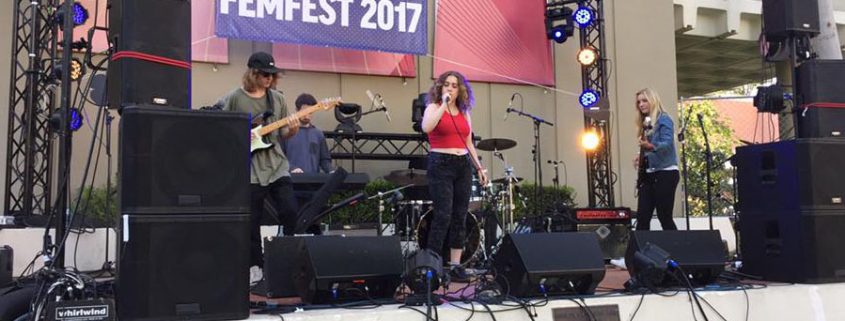FemFest celebrates female artists in local community
Founders Park sparkled with girl power on Saturday afternoon with deep purple shirts, colorful displays of neon art and vibrant buttons emblazoned with the Venus symbol. There, USC hosted its fifth annual FemFest, a festival that advocates for local female musicians and artists with a focus on intersectional feminism.
“This event started in 2013 as a response to the heavily male-dominated events such as Springfest, which happened again this year — it was a mostly male event,” FemFest Co-director Allegra Rosenberg said. “FemFest exists to give alternative female-led music a platform at USC.”
FemFest is a successful production thanks to USC’s Student Assembly for Gender Empowerment, combined with efforts from Undergraduate Student Government and MUSE, an organization that promotes women’s music in the USC community. These three organizations attempt to educate and expand the community of socially minded activists on campus as well as introduce new artists.
“I honestly love seeing all the bands, and I was really motivated by making this local,” Rosenberg said. “These are all really amazing local bands that come together to form this awesome local community, and I’m so excited to showcase that at FemFest.”
Bands that performed at FemFest included HOLYCHILD, a popular indie pop duo, as well as folk artist Miya Folick and DJ sets by Emmieshouse and Girlschool. Each musical act brought new dimensions to female power, demonstrating each of their backgrounds, stories and styles.
One of the highlights of the lineup was Inti Wawa, a Peruvian multi-instrumentalist whose genre is described as “Andean Pop” and “South American Folk Fusion” on her website. She and her accompanying musicians played a high-energy acoustic set that explored her familial history through language and explanatory interludes.
Along with the musical performers, FemFest also featured several other activities and vendors geared towards community engagement. One of these vendors was Whitney Bell, who owns her own intersectional feminist store, Kidd Bell. She sells crop tops with “Resist” embroidered on the collars along with buttons, dresses and stickers that aligned with her powerful, open message of hope for feminism in face of adversity.
“We always want to get more college students involved,” Bell said. “This seemed like the perfect opportunity.”
Kidd Bell opened just over six months ago and has already been asked to open up pop-up shops at festivals and colleges.
“[I love] making stuff that’s relatable to younger girls — getting them excited about feminism — and conversation pieces that get people talking about actual issues,” she said.
Bell’s merchandise focuses on female empowerment. At her booth, customers asked about future items and planned outfits with Bell as they browsed the racks and tables.
FemFest also featured a glowing neon paper piano keyboard where people could write and decorate notes about their feminist passions as well as a therapeutic sand art station. Other vendors decked out their tables with more FemFest merchandise, while interested attendees grouped on cozy blankets on the lawn.
As the evening progressed, fairy lights and neon post-its framed the final act of the night, HOLYCHILD, whose message of strength and unity left the audience with a sense of hope towards a more educated campus community.

